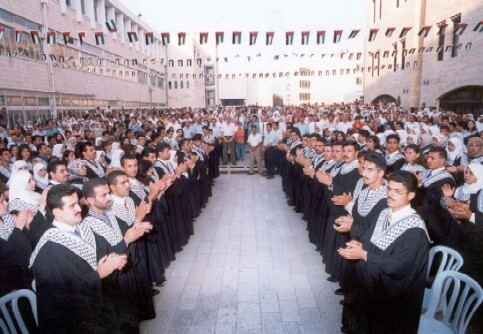
Graduation ceremony at Najah University in Nablus (Photo: NNU)
This week I visited family and friends in Nablus. We celebrated the wedding of my cousin Ghadir and a year after the Israeli invasions I went back to the old city to talk to people and smell my roots. At Najah University I visited ‘Ala, one of my best friends, who was busy organizing ceremonies for students graduating. The ceremonies that took place on 2, 3, and 4 July were the first graduation ceremonies since the eruption of the Palestinian uprising agains occupation and apartheid.
“Do you see the gates of the shops?” asks ‘Ala while walking next to me in the old city of Nablus. “What about them?” I say. “Look at the new gates and shutters. Every new one means the shop was looted, burned or invaded by Israeli soldiers. Just look at how fast people are rebuilding the destruction. It means that they have hope and a will to continue, meaning they’re determined to stay.” It’s strange to see destruction on the one hand, the misery of life under occupation and on the other hand people continuing their lives, talking about marriage, work, films, and every day life occasions. People live or rather survive.
“Is this ‘hodna’?” shouts a man at Huwara checkpoint. “I don’t know why they needed a break? Do you think the Iraqi people take a break resisting the occupation and looting of their land by US and British troops? Some would call this a truce, but do you think we have a break or vacation from occupation and apartheid? Every faction has its own interests. They couldn’t come up with one unified statement of the ‘hodna’. Do you think they asked the people in Jenin and Nablus what they think? Do you think we are asked about our opinions?” The man, who was stopped by Israeli soldiers blocking the way to Nablus, keeps on shouting. Some people around him try to silence him. “Sure, he says, people are tired, they don’t have work, income, and they’re sick and tired of the siege. On an individual level people need a break, but collectively, we’re determined.”
The discrepancy between the harsh conditions on people, their need to live ordinary lives in freedom and their determination in the justice of their cause is striking.
Watching Iraq
“Just how do people in the ‘West’ view the occupation of Iraq?” asked a shopkeeper in the old city. “Don’t they think that the Iraqi people after years of dictatorship, sanctions and wars, deserve to live in freedom? Why aren’t they allowed to rule themselves? We Palestinians know what occupation means. Colonial rule is racist, it puts its subjects under oppression. Ofcourse the ones oppressed resist. As with us, any act of resistance is termed terrorism, or in the Iraqi case demonized as coming from the remains of the Baath party or al-Qaida, but do people in the ‘West’ really believe this?” The shopkeeper looks confused. He doesn’t understand the world. Neither do I. Iraqi acts of resistance increase by the day. “The more they realize what occupation means, the more widespread this resistance will become”, the shopkeeper says confident. “God knows how long our hodna lasts. If it depends on Sharon and Bush, it won’t last long”, he says. “It’s just a matter of how the occupier eventually deals with the occupied people. If they treat them like animals, they shouldn’t be surprised when the response hits them.”
Every day arrests
At night, walking near the old city we hear the sounds of gunshots. “They come every night,” a resident of the old city says. “They arrest people every day.” This afternoon, while the graduation ceremony at Najah University took place, people saw Israeli jeeps driving through the main road in Rafidia. No break of the occupation, no vacation from oppression. People live, or rather, survive.
EI’s founder Arjan El Fassed currently visits the occupied Palestinian territories.




